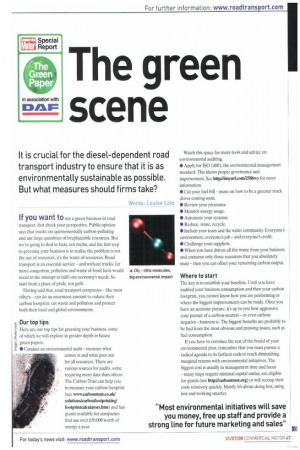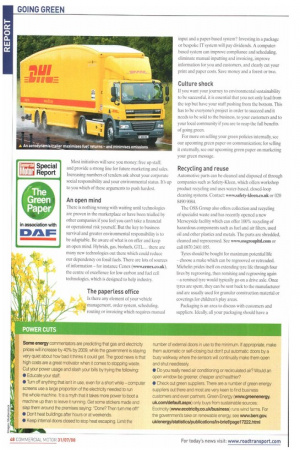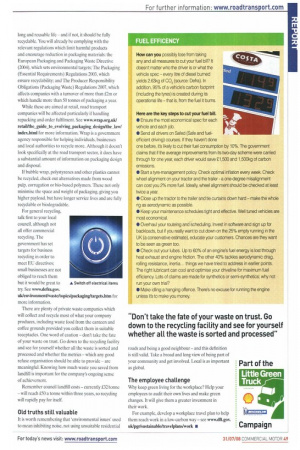The green scene
Page 47

Page 48

Page 49

If you've noticed an error in this article please click here to report it so we can fix it.
It is crucial for the diesel-dependent road transport industry to ensure that it is as environmentally sustainable as possible. But what measures should firms take?
Words: Louise Cote
Ifyou want to run a green business in road transport, first check your perspective. Public opinion says that trucks are quintessentially carbon-polluting and use large quantities of irreplaceable resources. But we're going to deal in facts, not myths, and the first step to greening your business is to realise the problem is not the use of resources, it's the waste of resources. Road transport is an essential service and without trucks, far more congestion, pollution and waste of fossil fuels would A CO2 little molecules, occur in the attempt to fulfil our economy's needs. So big environmental impact start from a place of pride, not guilt.
Having said that, road transport companies like most others can do an enormous amount to reduce their carbon footprint, cut waste and pollution and protect both their local and global environments.
Our top tips
Here are our top tips for greening your business, some of which we will explore in greater depth in future green papers.
• Conduct an environmental audit measure what comes in and what goes out for all resources. There are various sources for audits, some requiring more data than others. The Carbon Trust can help you to measure your carbon footprint (see www.carbontrust.co.uk/ solutionskarbonfootprinting/ footprintcalculators.htm) and has grants available for companies that use over £50,000 worth of energy a year. Watch this space for more tools and advice on environmental auditing.
• Apply for ISO 14001, the environmental management standard. This shows proper governance and improvement. See http://tinyuricom/2586wy for more information.
• Cut your fuel bill more on how to be a greener truck driver coming soon.
• Review your processes.
• Monitor energy usage.
• Automate your systems.
• Reduce, reuse, recycle.
• Include your team and the wider community. Everyone's environment, everyone's job and everyone's credit.
• Challenge your suppliers.
• When you have driven all the waste from your business and consume only those resources that you absolutely must then you can offset your remaining carbon output.
Where to start
The key is to establish your baseline. Until you have audited your business consumption and then your carbon footprint, you cannot know how you are performing or where the biggest improvements can be made. Once you have an accurate picture, it's up to you how aggressive your pursuit of a carbon-neutral or even carbonnegative business is. The biggest benefits are probably to be had from the most obvious and pressing issues, such as fuel consumption.
If you have to convince the rest of the board of your environmental plan, remember that you must pursue a radical agenda to its farthest ends to reach diminishing marginal returns with environmental initiatives. The biggest cost is usually in management time and focus many steps require minimal capital outlay, are eligible for grants (see http://carbonintst.org) or will recoup their costs relatively quickly. Mostly it's about doing less, using less and working smarter. Most initiatives will save you money; free up staff; and provide a strong line for future marketing and sales. Increasing numbers of tenders ask about your corporate social responsibility and your environmental status. It's up to you which of these arguments to push hardest.
An open mind
There is nothing wrong with waiting until technologies are proven in the marketplace or have been trialled by other companies if you feel you can't take a financial or operational risk yourself. But the key to business survival and greater environmental responsibility is to be adaptable. Be aware of what is on offer and keep an open mind. Hybrids, gas, biofuels, GTL... there are many new technologies out there which could reduce our dependency on fossil fuels. There are lots of sources of information for instance Cenex (www.cenex.co.uk), the centre of excellence for low carbon and fuel cell technologies, which is designed to help industry.
The paperless office
Is there any element of your vehicle ;Ili management, order system, scheduling, Ar routing or invoicing which requires manual input and a paper-based system? Investing in a package or bespoke IT system will pay dividends. A computerbased system can improve compliance and scheduling, eliminate manual inputting and invoicing, improve information for you and customers, and clearly cut your print and paper costs. Save money and a forest or two.
Culture shock
11 you want your journey to environmental sustainability to be successful, it is essential that you not only lead from the top but have your staff pushing from the bottom. This has to be everyone's project in order to succeed and it needs to be sold to the business, to your customers and to your local community if you are to reap the full benefits of going green.
For more on selling your green policies internally, see our upcoming green paper on communication; for selling it externally, see our upcoming green paper on marketing your green message.
Recycling and reuse
Automotive parts can be cleaned and disposed of through companies such as Safety-Kleen, which offers workshop product recycling and uses water-based, closed-loop cleaning systems. Contact: wwwsafety-kleen.co.uk or 020 8490 9084.
The OSS Group also offers collection and recycling of specialist waste and has recently opened a new Merseyside facility which can offer 100% recycling of hazardous components such as fuel and air filters, used oil and other plastics and metals. The parts are shredded, cleaned and reprocessed. See www.ossgroupltd.com or call 0870 2401 055.
Tyres should be bought for maximum potential life choose a make which can be regrooved or retreaded. Michelin prides itself on extending tyre life through four lives by regrooving, then remixing and regrooving again a remixed tyre would typically go on a drive axle. Once tyres are spent, they can be sent back to the manufacturer and are usually used for granular construction material or coverings for children's play areas.
Packaging is an area to discuss with customers and suppliers. Ideally, all your packaging should have a long and reusable life — and if not, it should be fully recyclable. You will already be complying with the relevant regulations which limit harmful products and encourage reduction in packaging materials: the European Packaging and Packaging Waste Directive (2004), which sets environmental targets; The Packaging (Essential Requirements) Regulations 2003, which ensure recyclability; and The Producer Responsibility Obligations (Packaging Waste) Regulations 2007, which affects companies with a turnover of more than .£2m or which handle more than 50 tonnes of packaging a year.
While these are aimed at retail, road transport companies will be affected particularly if handling repacking and order fulfilment. See www.wrap.org.uk/ retailithe_guide_to_evolving_packaging_designithe law/ index.html for more information, Wrap is a government agency responsible for helping individuals, businesses and local authorities to recycle more. Although it doesn't look specifically at the road transport sector, it does have a substantial amount of information on packaging design and disposal.
If bubble wrap, polystyrenes and other plastics cannot be recycled, check out alternatives made from wood pulp, corrugation or bio-based polymers. These not only minimise the space and weight of packaging, giving you higher payload, but have longer service lives and are fully recyclable or biodegradable.
For general recycling, talk first to your local council, although not all offer commercial recycling. The government has set targets for business recycling in order to meet EU directives; small businesses are not obliged to reach them but it would be great to try. See www.defra.gov. uk/environment/waste/topies/packaging/targets.htm for more information. A Switch off electricaL items There are plenty of private waste companies which will collect and recycle most of what your company produces, including waste food from the canteen and coffee grounds provided you collect them in suitable receptacles. One word of caution — don't take the fate of your waste on trust. Go down to the recycling facility and see for yourself whether all the waste is sorted and processed and whether the metrics — which any good refuse organisation should be able to provide — are meaningful. Knowing how much waste you saved from landfill is important for the company's ongoing sense of achievement.
Remember council landfill costs — currently £32/tonne — will reach £50 a tonne within three years, so recycling will rapidly pay for itself.
Old truths still valuable
It is worth remembering that 'environmental issues' used to mean inhibiting noise, not using unsuitable residential roads and being a good neighbour — and this definition is still valid, 'Take a broad and long view of being part of your community and get involved. Local is as important as global.
The employee challenge
Why keep green living for the workplace? Help your employees to audit their own lives and make green changes. It will give them a greater investment in their work.
For example, develop a workplace travel plan to help them reach work in a low-carbon way — see www.dft.gov. uldpgr/sustainableitravelplansiwork •
































































































































































